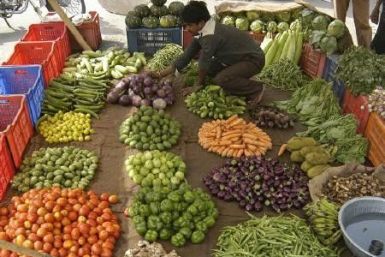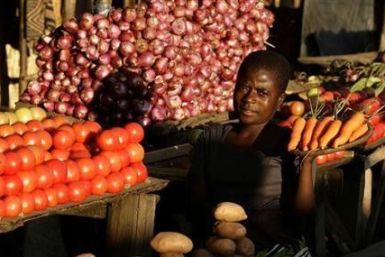China's gross domestic product is expected to grow 9.8 percent in 2011, with inflation likely to stand at around 3.7 percent for the year, the official China News Service said, citing a government think tank.
The euro zone inflation rate, excluding volatile energy and food prices, does not gauge future price pressures well, European Central Bank President Jean-Claude Trichet was quoted as saying on Sunday.
Consumers in most countries globally look set to keep a tight grip on spending in coming months as they worry about job security and rising inflation, a survey by the Nielsen Company showed on Sunday.
2011 will mark 40 years since the United States' government finally stopped redeeming its dollars for gold. That ended over 250 years of formal gold backing for the West's dominant currencies. It also took the entire world off precious-metal money for the first time in 5,000 years of civilization.
The U.S. Federal Reserve's latest $600 billion bond-buying program is built on the idea that most of the stubbornly high unemployment rate is reversible, if only borrowing costs are pushed low enough.
Mexico's unemployment rate fell more than expected in December, dropping to 4.94 percent in a sign that an economic recovery is gaining traction, data from the national statistics agency showed on Friday.
China's growth accelerated in the fourth quarter and its inflation slowed less than expected, fuelling concerns that harsher policy tightening is needed to keep the galloping economy on an even keel.
By lunchtime in London – and compared with New Year 2011's record highs – the Gold Price in Dollars stood 6% lower, in Euros 7.5% down, and in British Pounds nearly 9% lower.
Gold touched a two-month low in Europe on Friday, pressured by a firmer appetite for assets seen as higher risk on expectations the economic recovery was gaining traction, but a retreat in the dollar prevented a steeper drop.
Close on the heels of a China central bank adviser hinting at an imminent rate hike, a state-controlled newspaper has said more rate hike is on the cards, probably as early as in February, confirming the dominant view that Beijing will pull out all the stops to address what is becoming a serious political problem.
Asian stocks tumbled and commodities paused on Friday after a recent selloff on worries that rising inflation may invite aggressive policy tightening and hurt growth in the world's growth engines like China and India.
India's food inflation eased for the second straight week due to lower fruit and vegetable prices, data showed on Thursday, but an acceleration in headline inflation in December is likely to put pressure on the central bank to raise rates at a policy review next week.
China understands a stronger yuan is in its best interest although President Hu Jintao made no specific commitment to let the currency rise more rapidly, U.S. Vice President Joe Biden told Reuters on Thursday.
Reports that some financial institutions have started to exit their gold positions have been circulating this week, says French bank and London bullion dealer Natixis in its latest commodity analysis. Physically-backed ETF trust funds shrank almost 1% this week on Natixis' data - the sharpest weekly drop since we started keeping records in 2008.
U.S. stocks fell on Thursday led by losses in the technology sector and on worries that China's rapid growth may lead to more aggressive measures to tackle inflation.
Consumer prices rose a lower than expected 0.9 percent in Morocco in 2010, with gains in food prices offset by lower communications costs, the state planning and statistics authority (HCP) said on Thursday.
Malawi's central bank will be able to cut interest rates this year from their current 13 percent because of the southern African nation's steadily easing inflation, Reserve Bank Governor Perks Ligoya said on Thursday.
The central bank of Brazil raised its key interest rate by 50 basis points to 11.25 percent to help cool down its supercharged economic growth.
Gold fell like a stone on Thursday, following three days of gains, and ignored a recovery in the euro as investment demand waned. Spot gold fell over $20 to $1,348.55 an ounce by 1426 GMT.
Forcing banks to lock up more cash is China's most viable policy option for now as it battles inflation, though that won't shut the door on higher interest rates and faster rises in the yuan.
Stocks fell on Thursday led by losses in the technology sector and on worries that China's rapid growth may lead to more aggressive measures to tackle inflation.
China's economy recorded a 10.3 percent growth in 2010, coming back strongly from the global crisis, data released by the National Bureau of Statistics on Thursday showed.
























